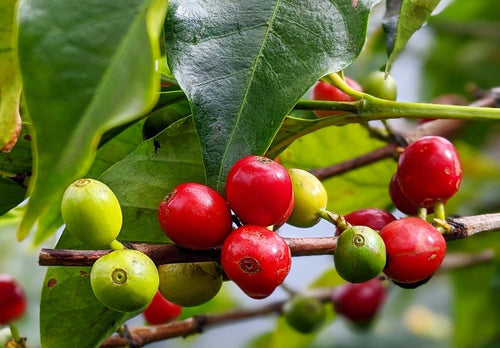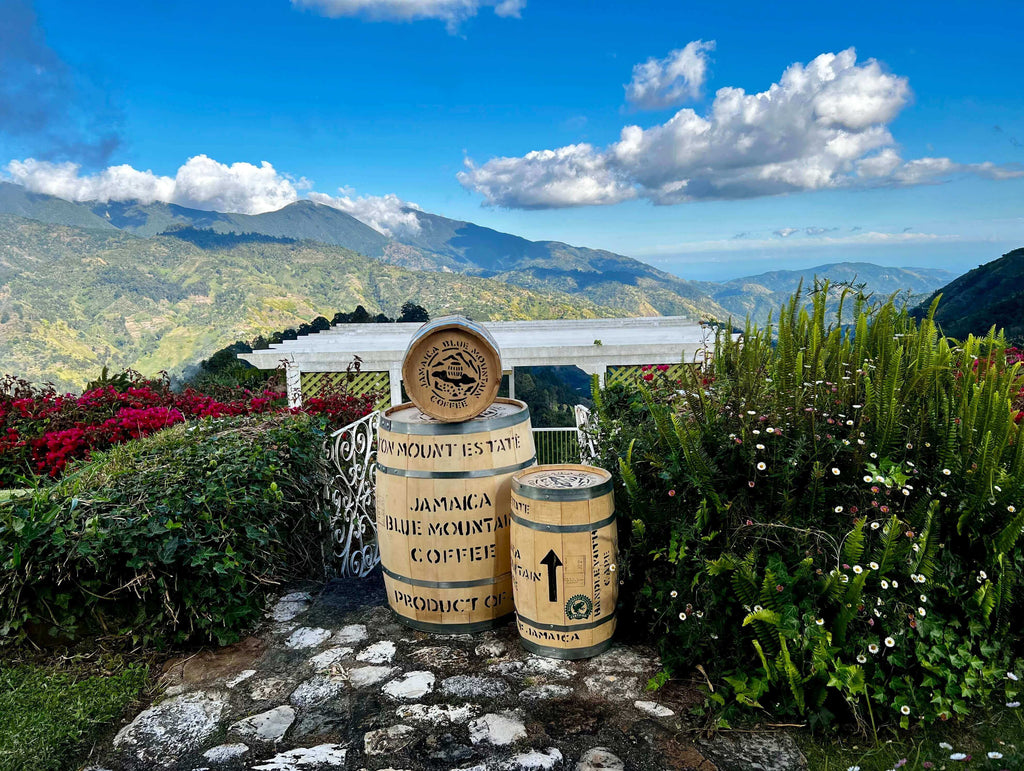10 Jan 2024
Many of our clients, roasters and consumers alike ask us often how to differentiate between authentic and imitations of Jamaica Blue Mountain, we thought it would be helpful for you to know a few tips and pointers to detect legitimate Jamaican coffee. There are 5 overarching ways to know if what you are buying is real; The price, the taste, the beans physical appearance, the seal of authenticity, traceability and the iconic wooden barrel and finally, the word blend.We hope you enjoy this short article!
1. Price
At first glance, the first identifier that Jamaica Blue Mountain (JBM) is authentic is the price. A good rule of thumb is this, if a kilo of roasted bluemountain is sold for under 100$ there’s a good chance something is up.
Although there are different grades and quality levels for this world renowned coffee, producers and farmers will never undersell their coffee, because the demand for jamaican coffee is very high.
2. Taste
Jamaica Blue Mountain® Coffee is renowned for its chocolate and hazelnut aromas, with a well balanced and a clean cup. The mouthfeel is smooth and velvety with a sweet lingering aftertaste. Jamaican coffee made its name on it’s subtle flavours, the fact that there is no bitterness and very little acidity in the cup.
When you open a bag of freshly roasted Blue Mountain coffee, the aromas should envelop you in a rich but delicate scent of chocolate, caramel or vanilla, depending on the roast or roaster you buy from.
3. The coffee beans: size and defect rate
The Jamaican Coffee industry takes great care and pride into the beans that are exported. All green coffee beans are sorted many times along the supply chain to ensure green coffee bean uniformity and one of the lowest defect rates in the industry. The official allowed defect rate for Blue Mountain is under 2%.
Jamaican coffee producers and exporters initially use water and machine sorting. Then, large numbers of people are employed to hand sort the coffee beans for grain defect and broken beans, size and insect damages.
The result of this are nice, round and uniform beans that roast beautifully. If you buy a bag of Jamaican beans and the beans are broken or of different sizes, ask yourself some questions.
4. Seal of authenticity, traceability and wooden barrels
Jamaica Blue Mountain is a trademark that is globally protected. All exporters and users of the Jamaican brand need to register with JACRA to export, distribute and sell Jamaica Blue Mountain products.When shopping for JBMC, look for a certificate of authenticity, the Jamaica Blue Mountain coffee seal, which has two versions.
Also, the Jamaican green coffee beans are always exported in wooden barrels of 15, 30 and 70 KG. These are specific to jamaican coffee exports and transportation. All these cues together should help you determine if a seller is offering authentic Jamaica Blue Mountain.
5. Look out for the mention “blend”
Of course, some roasters across the world will produce blends of Jamaica Blue Mountain mixed with other coffees from origins such as Colombia, Ethiopia or others. There is nothing wrong with that. JACRA, who monitors the jamaican coffee industry, allows roasters to use the JBMC blend appellation as long as they use a minimum of 30% Blue Mountain coffee within the blend recipe.
Allowing for the production of Jamaica Blue Mountain coffee blend is a good way to offer this coffee at a more affordable price point. On the other hand, be careful, blends do not mean that the coffee will be sold at the same price as other mass market coffees. Because of the cost of the Blue Mountain, a blend that respects the integrity of the international norms should sell around 30 to 40 dollars for half a kilo.
The five points discussed above are good indicators of an authentic Jamaica Blue Mountain supplier. As any other high end brands and luxury products, there will always be knockoffs and counterfeits. We hope this article will help and provide you, the consumer, knowledge on the jamaican coffee industry. If you are looking for a certified supplier we also created a where to find section on our website to help you find a coffee roaster in Canada that offers authentic jamaican coffee.

